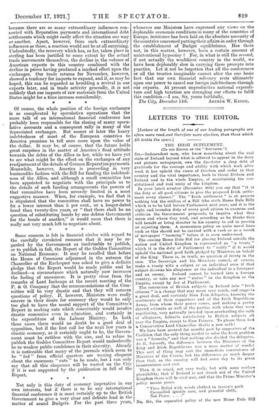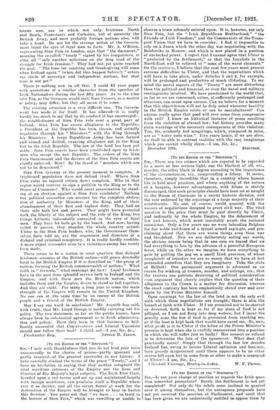LETTERS TO THE EDITOR.
[Letters of the length of one of our leading paragraphs are often more read,and therefore more effective, than those which fill treble the space.] THE IRISH SETTLEMENT.
(To THE EDITOR or THE " SPECTATOR."] SIR,—Independent men, who know something about the real state of Ireland beyond what is allowed to appear in the daily and picture newspapers, owe the Spectator a deep debt of gratitude for the courage and ability with which week after week it has upheld the cause of freedom and order in that country and the vital importance, both to Great Britain and Ireland and to the whole Empire, of maintaining the con- stitutional and real unity of the kingdom.
In your latest number (December 10th) you say that "it is the duty of all good citizens to give the proposed Irish settle- ment every chance." The " Irish settlement " is at present nothing but the outline of a Bill (the sixth Home Rule Bill) which is to be laid before Parliament next year, and it is the right and bounden duty of every good citizen to examine and criticize the Government proposals, to inquire what they mean and where they tend, and according as he thinks they will benefit or bring disaster to his country to aid in passing or rejecting them. A momentous policy on quite novel lines such as this should not be carried with a rush or us a result of newspaper " booming " before it is even understood.
The coming Home Rule Bill for placing Ireland outside the nation and United Kingdom is represented as "a treaty" which it is the duty of Parliament to " ratify" if it would uphold the national good faith pledged by Ministers on behalf of the King. There is, in truth, no question of treaty in the case. The Sovereign and his Ministers cannot, of course, make a treaty with a subject or an individual even if that subject disowns his allegiance or the individual is a foreigner and an enemy. Ireland cannot bo turned into a foreign country, or take any new " status" in the Kingdom or the Empire, except by Act of Parliament.
The conversion of British subjects in Ireland into " Irish citizens" is a change that may mean very much, and suggests a great deal, and certainly Sinn Fein delegates, knowing the sentiments of their supporters and of the Irish Republican Army, from whom their power comes, and making a pretty shrewd estimate as well of the parties with whom they were negotiating, very naturally insisted upon overhauling the oath of allegiance, hitherto satisfactory to British subjects all over the Empiro, except to Sinn Feiners. To please these last a Conservative Lord Chancellor drafts a new oath!
We have been assured for months past by supporters of the Coalition that the only thing needed to mire the Irish problem was a " formula," and that nothing else divided the delegates. As if, forsooth, the difference between the Ministers of the King and Irish Republicans was a mere matter or words! This sort of thing may suit the immediate convenience of Ministers of the Crown, but the differences go much deeper than that, as the country will find some day to its great inconvenience and cost.
Then it is urged, not very truly, but with some surface plausibility, that if Ireland is not struck out of the United Kingdom there will be civil war, and that the Prime Minister's policy means peace.
"Thus Belial with words clothed in reason's garb Counselled ignoble ease, and peaceful sloth, Not Peace. . . ."
No, Sir, the separatist policy of the new Home Rule Bill means tear, one in which. not only Irishmen North and South, Protestants and Catholics, but of :necessity the British Army, and most probably foreign nations also, will take a hand. Do not let the strange action of the Govern- ment blind the eyes of loyal men to facts. Mr. A. O'Brien, representing Sinn Fein in London, says that " the document," meaning the so-called " treaty " signed by his compatriots, is after all " only another milestone on the long road of the struggle for Irish freedom." They had not yet quite reached the goal. " The time for rejoicing and thanksgiving will come when Ireland again " (when did this happen before?) " enters the circle of sovereign and independent nations; but that lime is not.yet."
There is nothing new in all this. I could fill your paper with quotations of a' similar character from the speeches of Irish Nationalists during the last fifty years. As to the time (der Tag, as the Germans would say), Sinn Feiners, as a matter of policy, may differ, but they all mean it to come.
The existing situation is a very difficult one. The Govern- ment has made it for itself. It has allowed—it is really hardly too much to say that by its conduct it has encouraged— the establishment of Sinn Fein rule over a great part of Ireland. Sinn Fein has sworn allegiance to the Republic; a President of the Republic has been chosen, and actually negotiates through his " Ministers " with the King through his Ministers A, large Republican Army has been formed and armed and drilled, swearing allegiance not to the King but to the Irish Republic. The law of the land has been put aside. Sinn Fein courts have been established open to Irish- Men who accept the new 'Republic. The orders of the Sinn Fein 'Government and the decrees of the Sinn Fein courts are rigidly enforced. How? By the dread of " murders which are not to be denounced."
Sinn Fein tyranny at the present moment is complete. A frightened population dare not defend itself... Where Sinn rein rules no 'injured citizen dares complain. Who in that region would 'venture to sign a petition to the King or to the House of Commons? Who would court assassination by stand- ing at an election against a Sinn Fein candidate? Nothing but political cowardice can account for the complete abdica- tion of authority by Ministers of the King, and of their abandonment of their first and highest duty. They had on their side both law and power.' They might have protected both the liberty of the subject and the rule of the King, two things hitherto indissolubly connected in the eyes of loyal men. They have let both go by the board. And now, having failed to govern, they abandon the whole country outside Ulster to the Sinn Fein leaders, who, the Government them- selves have told us, are the organizers and directors of a disloyal and criminal conspiracy. It is really hardly credible. A more abject surrender even to a victorious enemy has rarely been made.
There seems to be a notion in some quarters that disloyal Irishmen—enemies of the British nation—will prove devotedly loyal to the British Empire if it is described as " the group of nations' forming the British commonwealth of nations." What faith in " fOrinula," what contempt for fact! Loyal Irishmen have in the past done splendid service both to Ireland and the Empire, and with these men the British nation, which includes them and the Empire, desire to stand or fall together. And they are right. For many a long year to come the main strength of the Empire will remain in the United Kingdom. No one can at the same time be an enemy of the British People and a friend of the British Empire.
May I say one word in conclusion? Mr- Asquith has raid, with truth, that Mr. Lloyd George is tardily carrying out his policy. The two statesmen, so far as the public knows, have always been in substantial agreement as to Irish administra- tion and policy. Have they been in that business so bril- liantly successful that Conservatives and Liberal Unionists should now follow their lead? I think not.—I am, Sir, &c.,







































 Previous page
Previous page